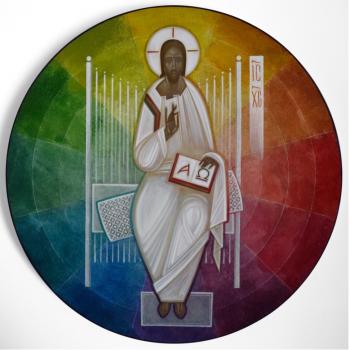
In a recent sermon, Andy Stanley, the Senior Pastor of North Point Community Church in Georgia, preached that Christians need to “unhitch” the Old Testament from their faith. I recommend watching the sermon so you can actually know what he says. Things start to get pretty wild around the 33-minute mark and this just ramps up around 36 minutes until the end. Watch it. Read my thoughts below and then let me know what you think!
Why does Andy preach this sermon?
Put negatively, Andy is trying to prevent people from losing their faith by removing any obstacles that might trip them up. Put positively, Andy is trying to remove any barriers to someone coming to believe the gospel of Jesus Christ. He is, to quote the Biblical text from which he’s preaching, attempting to “not make it difficult for the Gentiles who are turning to God.” This is a noble aim for a preacher and I commend him for it.
The main thing he mentions as being difficult for folks is the Old Testament with its often violent, disturbing and offensive content. He says many people have lost faith because the Old Testament contains things that trouble our modern sensibilities. Now, I don’t listen to much of Andy Stanley but from what I understand, he’s an effective preacher. I support his desire for the proliferation of the gospel but I think the solution he offers – ditching the Old Testament (OT) – is just not great.
Here are a few questions or concerns.
1. Is his perspective on the Old Testament a form of Marcionism?
**I want to be clear that I’m not labeling Andy Stanley a heretic. What I am doing is asking a question about the views he shared in one sermon. In a similar way to there being a big difference to saying something is not true rather than calling someone a liar, I am suggesting that Andy’s perspective – in this particular instance – sounds like Marcionism. This is not the same as calling him a heretic.**
Marcionism is one of the oldest (and most persistent) heresies of the Christian church. Briefly, this view draws a very hard line between the God of the Old Testament and the God of the New Testament assuming they are not the same. The God of the OT is a God of wrath and anger while the God of the NT is a God of love. The Marcion heresy also rejects the Hebrew Scriptures and any “Jewish” ideas and maintains much of the New Testament (as if it was possible to some how “keep” Jesus without his Judaism). In essence, Marcionism is the notion that the teachings of Jesus (full of grace, love, and mercy) are incompatible with the depiction of the God of the Old Testament.
There are a few lines that are particularly questionable:
Jesus’ New Covenant, his covenant with the nations, his covenant with you, his covenant with us, can stand on its own two nail-scarred, resurrection feet. It does not need propping up by the Jewish Scriptures.(35:26)
Peter, James, and Paul elected to unhitch the Christian faith from the Jewish Scriptures. And my friends, we must as well. (37:53)
Listen to the sermon and see what you think.
2. He throws the baby out with the bathwater
In this sermon, I think one error Andy makes is that he conflates the Jewish worldview of Jesus’ time and the Judaizing Heresy with the Old Testament Scriptures.
The worldview of Jews in Jesus’ day was not homogenous. It was complex (and the scholarly discussion seems even more complex!). It cannot be boiled down to legalism but it had much to do with the Law and faithful obedience to the Torah as the means through which God would set the world to rights (can you hear the influence of NT Wright?). One of the problems with the Jewish worldview was that it was ethnocentric. As the Chosen Nation, they looked down on the Gentiles. This was a gross misunderstanding of the Old Testament. They mistakenly understood themselves to be the chosen instead of the nations when, in reality, they were chosen for the sake of the nations. This, at least, is what the Old Testament Scriptures seems to clearly point to. The Jewish worldview, it could be said, prevented Jews from seeing what they should have seen in the OT: that God’s plan was from the very beginning the salvation of the world and that this plan was to be accomplished through Israel.
Moving on to the Judaizing Heresy. This is felt all over the New Testament, especially Paul’s epistles. Proponents of this heresy essentially argued that in order for a Gentile to be a proper Christian, they had to become Jewish. To be a Christian meant Jesus plus all these other things. That is, they had to follow the Law, be circumcised, observe dietary restrictions, etc. Fortunately, James, Paul & co. made it very clear that one need not become Jewish to follow Jesus (see Acts 15, Galatians, etc.). This view was clearly rejected.
What I think Andy does in this sermon is conflate the errors wrought by a myopic worldview (the worldview of Jews of Second Temple Judaism) and the Judaizing heresy with the Old Testament scriptures themselves. It is clear from the Jerusalem Council (as it has come to be known) and Paul’s letters, that the gospel is for the whole world and Gentile Christians don’t need to be Jewish to follow Jesus. Not requiring Gentile Christians to follow the law/Jewish custom is precisely how the leaders of the Christian church in Acts 15 responded. The Old Testament law is no longer binding. But this is not at all the same as unhitching from the Old Testament (as Andy argues). The Old Testament was not jettisoned. Their solution is not to ditch the Old Testament. This is because the Old Testament, despite its challenges, is not a hindrance to the proliferation of the Gospel. As the early church shows us, it was actually the primary means by which the gospel was preached.
3. He sets up an unnecessary binary
A second error I think makes is setting up an unnecessary binary. Andy seems to suggest that in order to avoid losing one’s faith, we are forced to choose between a rigid and unsustainable fundamentalism or drop the Old Testament.
Among the central dogmas of American fundamentalism is the strict, literalistic interpretation of the Scriptures (e.g. a literal 24-hour reading of Genesis 1). Andy Stanley rightly acknowledges that this system is a house of cards. Not only does our understanding of the world through science render many interpretations unsustainable, so too do advances in our understanding of the Ancient Near Eastern/biblical world. Granting the weakness (and harms) of fundamentalism, Andy’s so-called solution simply does not follow.
It’s not at all clear to me why Andy imagines two options: 1) either being a fundamentalist or 2) drop the Old Testament. How is this a workable solution? It certainly doesn’t seem to be a biblical one. It is difficult to deny that the Old Testament raises lots of difficult questions and poses challenges. Instead of just dropping it (as Andy claims James, Paul, and Peter do… when, in fact, they do not), why not slowly but surely work through the questions and challenges in a reasonable way? There do exist reasonable interpretations to the knottiest passages of the Old Testament. I think this is the approach most churches take.
At the end of the day, Andy wants people to come to have a relationship with Jesus. Amen. He wants sinful people to know the love and grace of the Father who sent his Son as the sacrifice for their sins. Amen. The trouble is, these words lose much of their meaning when divorced from their context, which is the Old Testament. If you ditch the Old Testament, I think you end up ditching Jesus too.











